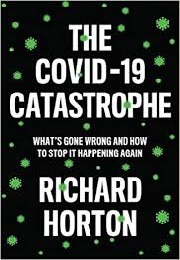The Covid-19 catastrophe: What's gone wrong and how to stop it happening again?

Richard Horton
Polity, £10.99
The Lancet editor-in-chief, Richard Horton, was busy in the first half of 2020, penning numerous editorials and making comments to the press in response to the Covid-19 pandemic. This book is an extension of that work and produced in the timely manner that has been characteristic of research and science writing about Coronavirus. It provides useful summaries of the ideas in infection control, epidemiology, and public health measures that non-specialists are now becoming increasingly familiar with as they enter everyday conversation regarding travel, social interaction, and workplace safety.
The book begins with an introduction to what is currently known about the origins of SARS CoV-2, and the early responses to the emerging case numbers in China. Horton pulls no punches in his assessment that the scale of suffering was by no means inevitable or natural, but rather the result of "the greatest science policy failure in a generation". There is a summary of the international responses and attention is drawn to both relative successes, and comparative failures. Horton argues that the contrasting outcomes in death rates in terms of economic and race disparities, reflect the unequal society we live in, stating that "Covid-19 has only amplified long-standing inequalities."
The book also discusses the tragedy of the disproportionate deaths of healthcare workers and people in care homes, and attributes these to political decisions and governmental failure to protect those they were supposed to protect. Horton believes that when solidarity and collective action as bedrock principles of effective public healthcare are no longer taken as foundational, the loss of life and long-term health impacts are immense, especially for the poorest and most vulnerable in our society.
While "national security means health security", as Horton contends, "SARS CoV-2 transcends states, borders, and sovereignty." A consequence of this is that "no person, no country, can survive in splendid isolation", as Horton argues, building on his earlier lamentation that "national failings became sublimated into international attacks."
In the final chapter, Horton appropriately cites Albert Camus when he says "you must not, must never get used to seeing people die like flies in our streets", and he feels that we should retain our capacity to be horrified, and to act on those feelings of horror. As the pandemic continues to unfold, and as countries 'reopen', with fears of a second wave, and with over half a million deaths at the time of writing, it strikes me that both Horton and Camus have a point.
While a short book, I feel it would have benefited from an index and a bibliography in addition to the notes accompanying the text. This book is a useful summary for a general reader, and while specialists will already be familiar with the science, they may still find the discussion of the political dimensions of science fruitful, even if they don't share Horton's conclusions.
Conor McCrory MRSB


